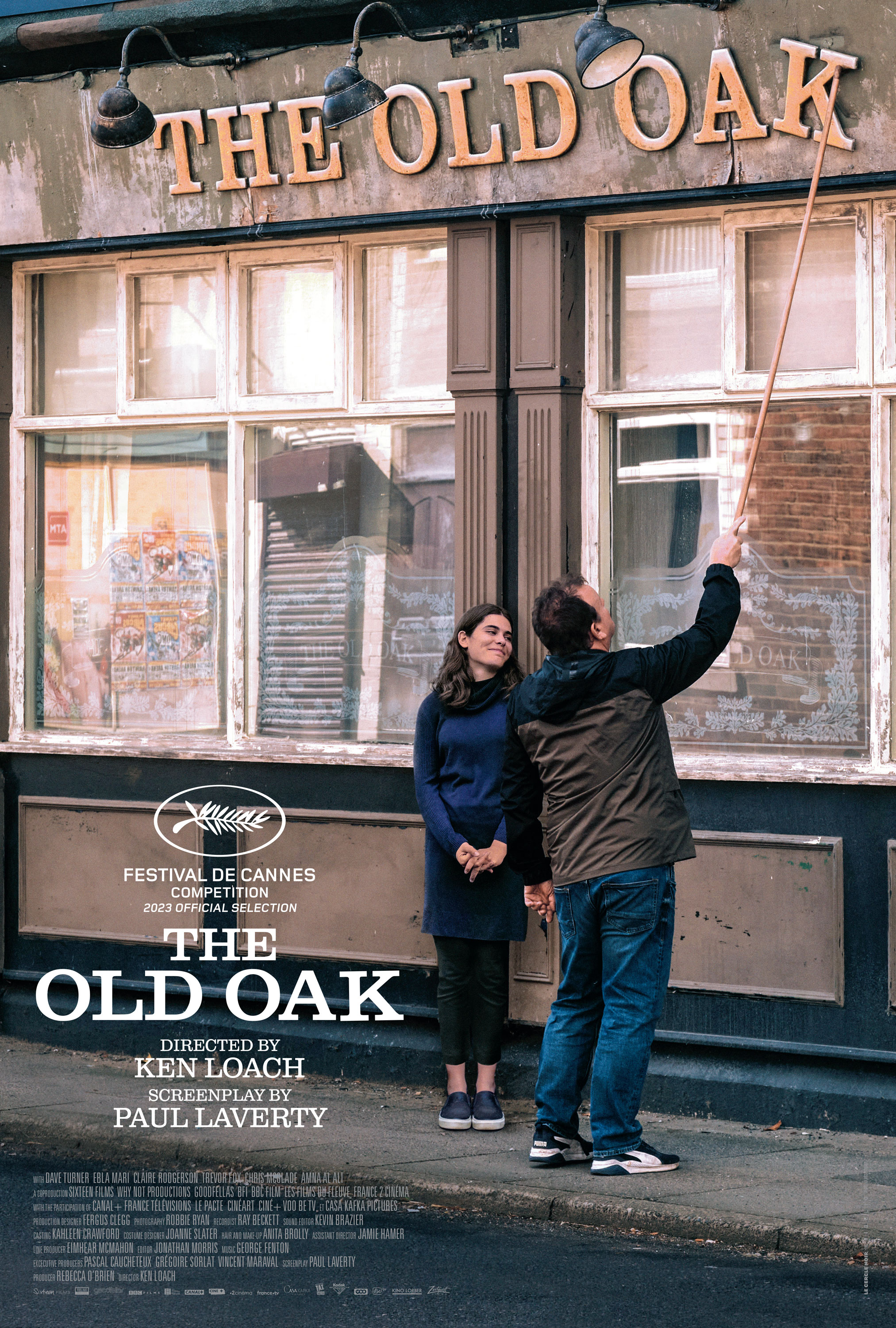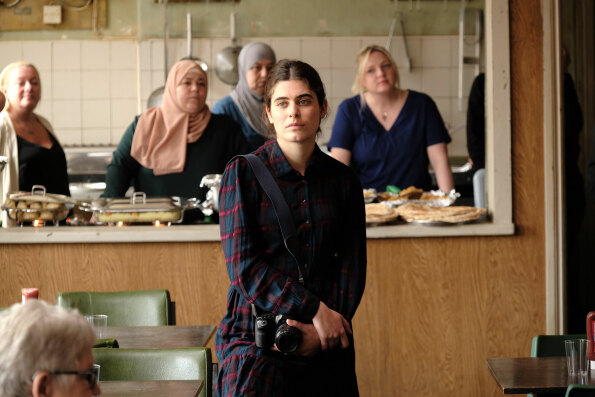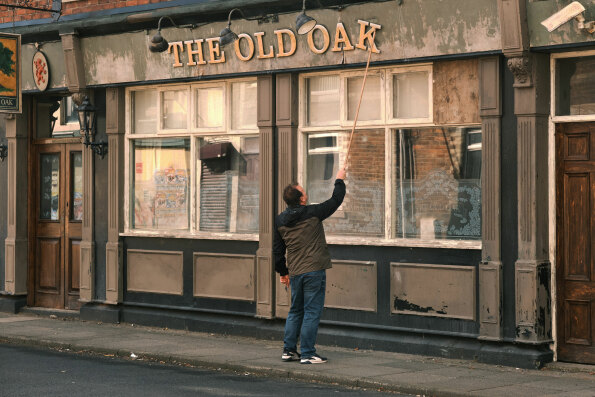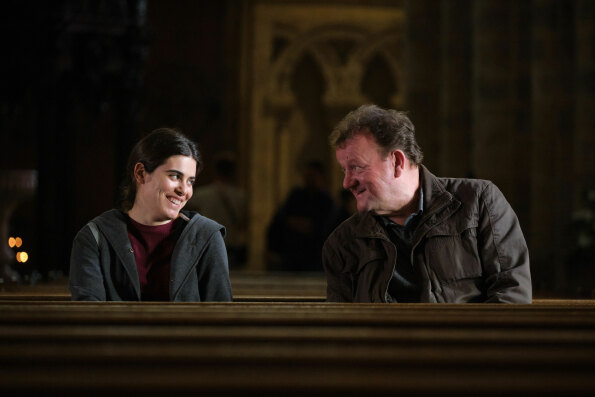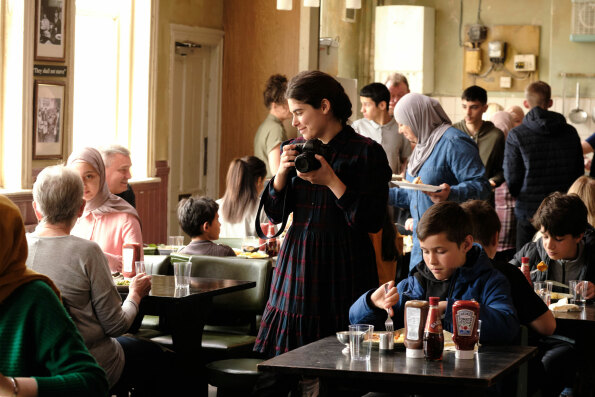The Old Oak
The Old Oak is the last pub standing in a once thriving mining village in northern England, a gathering space for a community that has fallen on hard times. There is growing anger, resentment, and a lack of hope among the residents, but the pub and its proprietor TJ are a fond presence to their customers. When a group of Syrian refugees move into the floundering village, a decisive rift fueled by prejudices develops between the community and its newest inhabitants. The formation of an unexpected friendship between TJ and a young Syrian woman named Yara opens up new possibilities for the divided village in this deeply moving drama about loss, fear, and the difficulty of finding hope. The release of The Old Oak reunites legendary British director Ken Loach with Zeitgeist Films and Kino Lorber following our 2020 release of his film Sorry We Missed You. Loach, who is 87 years old, has announced that The Old Oak will be his final film.
The Old Oak is a Zeitgeist Films release in association with Kino Lorber. It opened in theaters on April 5, 2024. To book this film please contact Nancy Gerstman or Emily Russo.
A press kit, trailer, stills, jpegs of the poster and social media assets are or will be available to download from our Exhibition DropBox. (Please note: when you click on any item to download you can ignore the login request and click on "Continue to download only.")
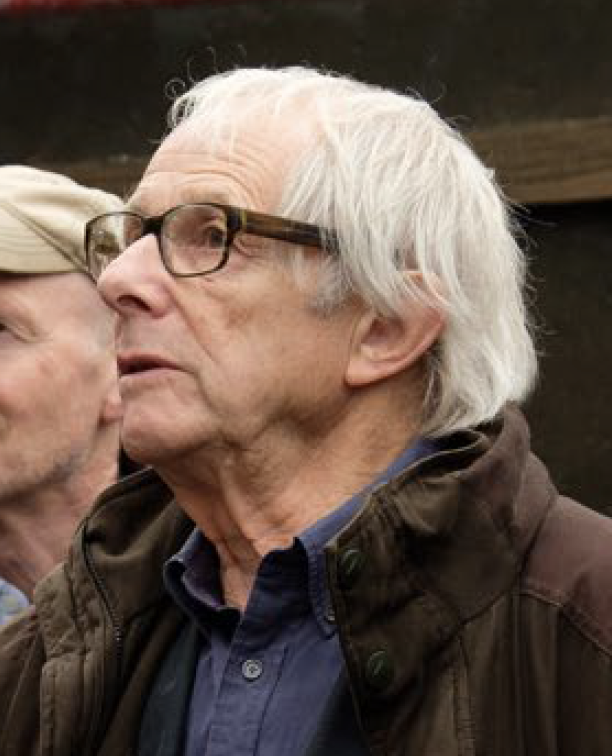
Ken Loach
Ken Loach was born in 1936 in Nuneaton. He attended King Edward VI Grammar School and went on to study law at St. Peter’s Hall, Oxford. After a brief spell in the theatre, Loach was recruited by the BBC in 1963 as a television director. This launched a long career directing films for television and the cinema, from Cathy Come Home and Kes in the sixties to Land and Freedom, Sweet Sixteen, The Wind that Shakes the Barley (Palme d’Or, Cannes Film Festival 2006), Looking for Eric, The Angels’ Share and I, Daniel Blake (Palme d’Or, Cannes Film Festival 2016).
“It's as engrossing, thoughtful, heartfelt, angry, hopeful, and altogether valuable as [Ken Loach's] best work. If it is indeed Loach's farewell, it's one hell of a fine note to go out on.” – Matt Zoller Seitz, RogerEbert.com
“Moving. The film has a graceful simplicity. Its cast of nonprofessionals (some of them refugees themselves) perform with little adornment or unnecessary emoting. With The Old Oak, Ken Loach goes out with one last, full-throated call for brotherhood and solidarity. It’s the most hopeful the old soldier’s been in years.” – Bilge Ebiri, Vulture, New York Magazine
“A timely story about modern Britain, immigration, and xenophobia. A parting statement from Loach—one last rallying cry for solidarity—and a fitting coda to his six-decade long career” – Rory O’Connor, The Film Stage
“Extraordinarily compassionate... What could well be Ken Loach’s final film has as much fire and fury as his debut Poor Cow did in 1967.” – Damon Wise, DEADLINE
“The Old Oak makes for quite the cherry on top of a splendid body of work.” – Marshall Shaffer, Slant Magazine
“At the grand age of 87, the two-time Palme d’Or winner is leaving us with one last film, and it’s a striking and deeply Loach-esque way to conclude a legendary career. In The Old Oak Loach is a cinematic powerhouse, one whose legacy is vast and near-impossible to summarize. He’s also the last of a dying breed. There will never be another Ken Loach, and not just because his talent is so tough to replicate.” – Kayleigh Donaldson, Paste Magazine
“You have to hope The Old Oak won't really be Ken Loach's last film. But if it is, the 87-year-old director is going out with voice undimmed - holding to account not just the wealthy, but the underdogs he's so long championed and making a stirring case, as he always has, for compassion.” – Bob Mondello, NPR’s All Things Considered
“A ringing statement of faith in compassion for the oppressed… a film-making language utterly without the cynical twang that is de rigueur for everyone else.” – Peter Bradshaw, The Guardian
“A poignant and moving coda to a career spent chronicling personal indignities amid broader social ills like poverty and unemployment... Loach seeks to end a trilogy of films set in northeastern England on a message of conciliation and hope.” – Jocelyn Noveck, Associated Press
“Inspired. Succeeds in tugging at our heartstrings. Loach has the end credits play over footage of the annual march to Durham Cathedral to honor the miners’ legacy, which includes a blessing of banners. Among them is one made by Syrian refugees, proclaiming, ‘Strength, Solidarity, Resistance.’ This beautiful image is the perfect visual shorthand for the locals’ acceptance of their new comrades.” – Mitch Abidor, Jewish Currents



